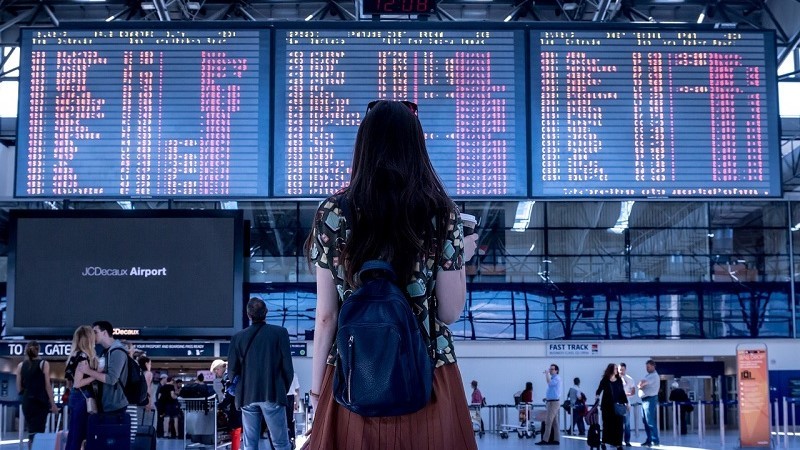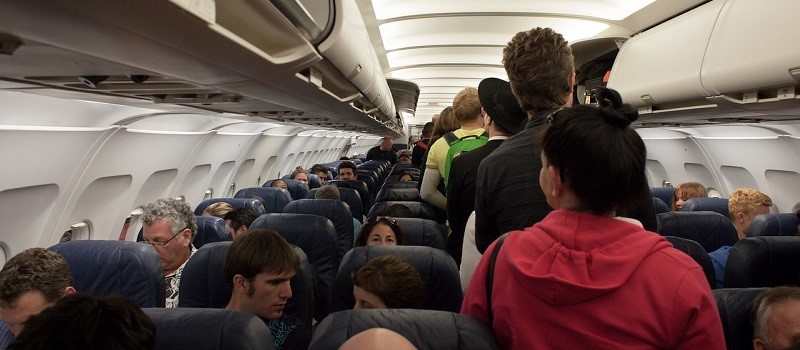

In the UK one in four people experience mental health issues every year.
That means on your average Airbus A340, roughly 93 passengers will be experiencing some form of mental health issue. And chances are the cabin crew (and the other 282 passengers) will be none the wiser.
If those challenges are relatively mild, those passengers may just seem like nervous fliers. Or a little agitated.
Severe and enduring conditions that requires ongoing support can manifest themselves more overtly and make episodes more likely. But this again could be interpreted as a passenger simply being unruly, rather than having challenges.
While cabin crews are given support to maintain their mental health, they are not always taught how to handle someone experiencing issues themselves.
So, despite the fact that, statistically a quarter of passengers experience difficulties; airlines and manufacturers have been incredibly slow at developing ways in which they can support these passengers effectively.
The problem airlines face is knowing what improvements to make that balance cost effectiveness while actually making a meaningful difference for those individuals.
Good mental health means that you can think, feel and react in the ways that you need and want in order to live your life.
If you’re going through a period of poor mental health then the ways you're frequently thinking, feeling or reacting becomes difficult, or even impossible, to cope with. This can feel just as bad as a physical illness, or even worse.
The challenge for manufacturers and airlines is that poor mental health is a spectrum. It covers everything from depression to bipolar disorder.
Any attempt to accurately sum up what ‘having mental health issues’ is like would be to marginalise a lot of the people you were trying to help.
Plus, it – for the most part – is an entirely hidden condition. Very few people broadcast the fact that they have or had mental health issues.
Although a great deal of work has been done in the UK and elsewhere to combat stigma surrounding mental health issues, many still feel uncomfortable discussing it. Also, the attitudes and approaches vary wildly depending on where you are in the world.
This makes it very difficult to offer any consistent support.
That issue aside, the big question is: where do you start?
For someone experiencing generalised anxiety disorder (GAD), the kind of support required will be very different compared to someone with severe depression.
GAD causes the individual to worry excessively about hypothetical problems – most of which are grounded in the future. An endless procession of ‘what ifs’ that can make flying incredibly stressful. To the point that a passenger can be in a state of panic for the duration of the flight. Although outwardly nothing may seem to be wrong.
Depression on the other hand can manifest itself with in the form of anger, irritability and agitation. Which could easily be confused with hostile or threatening behaviour. Throw in feelings of low self-worth, poor concentration and generally feeling lousy and a plane is not a great place to be.

Aircraft are designed for mass conveyance, much in the same way as ferries and buses. That means – for the most part – planes follow a standard design from fuselage to interiors.
That doesn’t mean that planes aren’t without personalisation or flourishes, but aircraft are designed to offer a universal level of comfort and support. Especially for economy.
That said, airlines are making inroads to better support individuals with physical disability. British Airways reportedly has approximately 50,000 customers with disabilities, of which up to 2,000 need support. The airline provides ‘special assistance’ to these passengers in order to give them with the best flying experience possible.
The level of special assistance passengers receive varies from airline to airline – and even airport. Partly because service and attitudes towards people with physical disabilities varies as much as it does towards those with mental health issues.
But usually special assistance can include help getting to the plane and boarding. For individuals using a wheelchair, the airline will provide a means to get them onboard and allow them to move around the cabin while maintaining their dignity.
Where the individual is travelling with a carer or a person they rely on for support with their disabilities, the airline will usually ensure they can travel together.
These are all relatively easy steps to ensure those individuals with physical disabilities are able to travel.
When it comes to mental health issues (or a learning disability) it’s far less obvious what would be of benefit to the individual. Especially when the challenges and triggers can vary so wildly from one person to the next.
Conveniently the kind of changes that can be made to improve the flight experience for individuals with mental health issues would improve the experience for everyone else too.
Travelling internationally is stressful.
Getting to the airport three hours before a flight, navigating through a busy, noisy, brightly lit place can be overwhelming for an inexperienced traveller let alone someone who suffers from anxiety.
Check in, security and boarding all offer scenarios under which someone with mental health issues can find challenging.
And they’re not even on the plane yet.
Measures to make this process as easy as possible for everyone - not just people with mental health issues - would make the experience more positive. If everyone is more relaxed and in less of a rush (and less agitated) it would benefit someone with mental health issues far more than providing them with special treatment. Especially as being singled out can actually make feelings of anxiety or depression worse.
Helping the individual to still feel like they have some influence over what is happening to them is important in keeping them calm and happy.
Providing clearer communications and informational content to all passengers, that gives clear instruction over the different stages of travel would also help to reduce stress and anxiety.
Inside the plane individuals with mental health issues – as well as those with learning disabilities – can find the noise, smell, temperature, cramped conditions, crowded aisles, limited legroom and the invasion of personal space overwhelming.

That’s assuming they aren’t already experiencing difficulties about the prospect of flying.
Simple improvements to the interior of aircrafts can go a long way to helping someone with poor mental health feel more comfortable.
Softer fabrics, noise cancelling headphones, wider arm rests and lower light levels all help the individual maintain a sense of equilibrium and help to feel relaxed.
The good news is that manufacturers are starting to take note.
Boeing’s 777X boasts a host of technology to make flights more pleasant. Air filtration and humidity systems will make the cabin naturally more comfortable to be in.
The manufacturer’s Smooth Ride Technology also reduces the pitch and roll from turbulence making the flight smoother. This helps to keep all passengers calm and content on the flight.
Ceiling treatments – which will become increasingly common – are not only incredibly cool but gives individuals with learning disabilities and mental health issues something to focus on during take-off and landing.
There has been talk making movies and music available from the moment passengers board which would also give individuals something to focus their attention on. Rather than slipping into worry spirals.
The truth is that any changes will be very gradual. Simply because any innovations in terms of interiors need to have a market for the manufacturers and a return for the airlines.
Many feel the support offered to people with physical disabilities only meets the bare minimum. So, it’s difficult to see what can be done in order to effectively support individuals with mental health issues.
Despite such a high proportion of the population experiencing mental health issues, the unquantifiable nature of the issues makes it very difficult to make a business case.
Which would need to be very strong to make sweeping changes across the tens of thousands of commercial aircraft in service.
In the meantime, the innovations surrounding inflight experience will help to make individuals with mental health issues feel more comfortable.
There is also value in training cabin crew to better understand mental health issues and how they can provide support to people they believe may be struggling.
One must wonder if airlines should give passengers the option to disclose their mental health issues when booking their flight, in order for the airline to provide that support.
It will also give them the hard data they need to justify making the changes to plane interiors.
KDC Resource are actively recruiting for a variety of roles across the aerospace and EVOTL sectors. If you’re in the market for an exciting new role then send us your CV or view our latest vacancies.
If you’re looking to recruit top engineering talent in the aerospace industry, get in touch today and a member of the team will be happy to help.